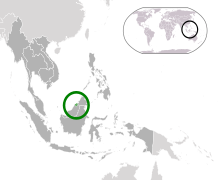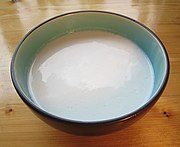Bruneian cuisine

Bruneian cuisine concerns the cuisine of Brunei. It is similar to, and heavily influenced by the cuisine of neighbouring Malaysia, Singapore,[1] and Indonesia, with additional influences from India, China, Thailand, and Japan. As is common in the region, fish and rice are staple foods, though beef is expensive and thus less common. Due to the predominance of the Islamic religion, the food is halal and pork is avoided. Alcohol is banned in Brunei.[1] In rural areas, game animals such as wild birds, sambar deer, and barking deer are hunted.
Foods and dishes[]
Dishes from Brunei are often spicy, and are commonly eaten with either rice or noodles. Beef rendang, nasi lemak and pajeri nanas, are popular foods in Brunei.[2] Among the few dishes peculiar to Brunei is ambuyat, a sticky ball of flavourless sago starch, which is wrapped around a bamboo fork and dipped into a spicy and sour gravy. Nasi katok, which literally means "knock rice", is a popular meal which consists of plain rice, fried chicken and sambal, a spicy relish made from ground chili peppers and a variety of secondary ingredients including but not limited to shrimp paste, garlic, ginger, shallot, scallion, palm sugar, lime juice, vinegar and anchovies. Nasi katok is traditionally served wrapped in brown paper.
Beverages[]

Common drinks include coconut milk, fruit juice, tea and coffee. Food from many other cultures, such as Chinese and Indian, are present in Brunei.
References[]
- ^ Jump up to: a b "Cuisine of Brunei". ifood.tv. Archived from the original on 29 August 2012. Retrieved 30 September 2010.
- ^ "Brunei - Cuisines of Brunei". 1Up Travel. 17 May 2007. Retrieved 30 September 2010.
- Brunei 2009. Oxford Business Group. ISBN 1-907065-09-1, ISBN 978-1-907065-09-5 . Pg 213 [1]
External links[]
| Wikimedia Commons has media related to Cuisine of Brunei. |
- Bruneian cuisine


